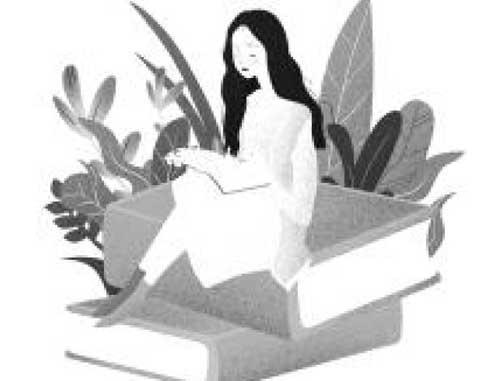阅读教给我的人生

Nature. Nurture. Novels. If you grew up preinternet—were talking the 70s and 80s (“the olden days”, as my daughter calls it) —books brought you up, exerting as much influence on who you were and who you became as anything, or anyone. My school friends and I, some bookish, others not, all read ourselves into being and navigated our way through the wilds of childhood and adolescence with dog-eared novels as maps. There wasnt much else to do. And you had to get your information from somewhere.
Parents—laissez-faire baby boomers(helicopter parenting hadnt been invented)—werent particularly interested and, if asked, would usually send you off in the wrong direction, to the wrong bookshelf, to something dusty—“Oh, I loved Vanity Fair at your age!” —not understanding our craving for fat books with silver-embossed covers, smelling of hormones and airports and America, page corners sticky from rereading, books that showed us dazzling new worlds—outside the suburb, beneath our skirts—and had all the best lines.
At a time when TV was rubbish, the local library was a refuge and a computer game meant Pac Man, we read ferociously, without cynicism or snobbery, inhabiting every page, dream readers—first as kids, then under the duvet with a camping torch, then as young teens—and it influenced who we were, who we became.
Its all still there: we are what we read. The current teen generation will leave behind a huge digital footprint—endless mortifying photos, videos, texts—but we left little, a few red-eyed snaps, some scratched vinyl records and a long, beloved reading list spanning Malory Towers to Sweet Valley High, Adrian Mole to Anne of Green Gables.
At a time when talking to children about emotions was seen as largely unnecessary—“Nope, lifes not fair,”distracted parents would shrug—books filled in childhoods lonelier gaps, made us feel better, a little more understood.
For sweet, brutal justice there was Roald Dahl—Veruca Salt had it coming. The sisterless had Little Women(“What would Jo do?”). For the fantasy of hearty sibling adventure on boats while we squabbled in the landlocked shires, The Famous Five—although the best thing about Enid Blyton was that she was so prolific, it meant youd almost never run out of books. And if you were a latchkey kid, there was the happy possibility of stumbling into your very own secret garden, a patch of the rec behind the broken swing that could be yours, somewhere you could read undisturbed without being called a swot. When things got really bad—bullied at school, forced to share the dampest, smallest bedroom with your most annoying brother—well, at least you werent at Gateshead Hall with poor Jane Eyre.
When puberty hit, books could save your life, certainly save face. School sex education merged with worrying diagrams, forcing us to retreat to the warm bath of Judy Blumes novels—Are You There God? Its Me, Margaret and Forever in particular. If Blume knew what crushes and periods and being 13 felt like, Jilly Cooper knew all about the dizzying possibilities of a riding crop and studded our dreams with Rupert Campbell-Black. In a paragraph, Jackie Collins could transport us from a grubby bunk bed to a Hollywood fourposter. While Shirley Conran, author of the unsurpassable Lace, introduced us to kick-ass career women.
Word of mouth was everything. If your best mate didnt rate it, it probably wasnt worth reading. It was always about the story and characters, never the author, who usually looked as dreary as any other grownup in the jacket photo and who, like your parents, somehow got in the way of the experience. Cult books were heatedly passed from one girl to another, dissected late into a sleepover, held above our heads as we sunbathed covered in baby-oil in parks, borrowed, “lost”, reluctantly returned. Infinitely precious, they would tell you things that even your ballsiest big sister didnt know, that your mother didnt think you should know. So subversive, they were thrillingly never stocked in the school library. Virginia AndrewsFlowers in the Attic was one, a brilliantly implausible saga of an evil grandmother. Better still, it was part of a series, like all the best books. You could create collections. Nothing beat the sight of my sacred Andrews books—all bought with hard-earned newspaper round money—lined up on my bookshelf, in order.
We read “proper” literature too, not giving a hoot about genres or critical acclaim, only about the book. It rocked or it didnt. It was silent, or it spoke to us—still the best test I think. I read Jeanette Wintersons Oranges Are Not the Only Fruit over and over, feeling forever changed by it. The Catcher in the Rye whispered in our ear, disruptively, like our cleverest, most cynical friend during assembly, crossing decades and continents: we knew all about phonies after all. Anne Frank was a heroine: her voice leapt off the page. And who didnt want to deliver a lemony one liner like Elizabeth Bennet? Or wander the midsummer meadows in Dodie Smiths I Capture the Castle?
Of course, books enthrall and influence us all our lives but there is a rawness to reading when young, a blissfully entitled sense that the stories we read are ours, a world grownups, least of all parents, cant enter. And still cant: when I earnestly asked my 12-year-old son, a prolific reader and fan of the kind of quasi-violent teenage fiction I dont really approve of, which books had inspired him (I was digging for R.J.Palacios Wonder or John Greens The Fault in Our Stars), he looked away, shrugged,“Hmm, dunno really,” as if hed never picked up a Kindle in his life.
I probably would have said just the same had my mother asked me the same question. Only she didnt ask. Because it was the olden days and we were left to get on with it, roam free, read free. Lucky us.
自然。滋養。小说。如果你成长于互联网诞生前的时代——我们说的是70年代和80年代(“旧时代”,就像我女儿说的那样)——书籍伴你成长,就像其他任何东西或任何人一样,影响着你的性格,还有你的人生路。我和学校里的朋友们,有些是书痴,有些不是,都通过阅读来造就性格,并用被翻得卷角的小说作为地图,指引我们安全地行驶过童年期和青少年时期的狂野时光。没有太多别的事情可做。而你又不得不通过某种途径来获取信息。
父母亲们——婴儿潮时期出生的自由主义者们(“直升机父母”尚未出现)——对孩子们并不是特别感兴趣,而且,如果被问及的话,常常会给你指错方向,指错书架,指到某些故纸堆里去——“噢,我在你这个年龄的时候喜欢看《名利场》!”——不明白我们的渴望,我们渴望那些银色浮雕封面的大部头作品,那些荷尔蒙、机场和美国的气息,那些因反复阅读变得黏糊的书角,那些向我们展示闪亮新世界的书籍——郊区之外,裙子之下——还有着一切最美的文字。
曾几何时,电视节目一文不值,本地的图书馆是人们的避难所,而电脑游戏只有《吃豆人》,我们于是狠命读书,既不愤世嫉俗也不附庸风雅,以每一页为寄托,成为理想的读者——首先是孩提时代,然后是打着野营手电筒藏在羽绒被下的日子,后来成了青少年——它影响了我们的性格,还有我们的人生路。
那些影响依然存在:我们成为怎样的人取决于我们读了什么书。如今的青少年一代将会留下巨大的数字印记——无数的恶搞照片、视频、段子——但我们那一代几乎没有这些,只留下很少的红眼照片、一些刮痕乱七八糟的黑胶唱片,还有一张长长的挚爱书单,包括了《玛洛丽塔女中》、《甜蜜谷》、《少年阿莫的秘密日记》、《绿山墙的安妮》。
曾几何时,与孩子们谈论情感被视作毫无必要——“不,生活就是不公平的,”心不在焉的父母亲们会耸耸肩说道——是书籍填满了童年孤独的空隙,让我们感觉好点,被理解多一点。
想要看美好而无情的正义,有罗尔德·达尔的小说,里面的人物维露卡·索尔特就遭遇到了。没有姐妹的孩子可以看《小妇人》(“乔会怎么做呢?”)。对于喜爱幻想兄弟姐妹一起乘船大冒险却又整天在内陆城镇吵得不可开交的我们来说,有《五伙伴历险记》——尽管伊妮德·布莱顿最棒的一点是她特别高产,这就意味着你几乎从来不会没书可读。而如果你是个“钥匙儿童”的话,你也许能开心地蹒跚步入你自己的秘密花园,破旧秋千后的一小块场地可以是你的地盘,在那里你可以不被打扰地尽情阅读而不会被人叫做书呆子。当情况糟糕透顶时——在学校被欺负,在家被迫与你最烦人的兄弟共住最潮湿最狭小的卧室——嗯,至少你不是和可怜的简·爱一起住在盖茨黑德府。
当青春期来袭时,书籍可以拯救你的人生,当然也可以挽救你的颜面。学校里的性教育融入了各种令人担心的示意图,强迫我们撤退到朱迪·布鲁姆的小说的温暖沐浴中去——特别是《上帝,你在那里吗?是我,玛格丽特》和《永远》。如果说布鲁姆明白迷恋上别人、来例假和13岁时的心理状态,那么吉莉·库珀就懂得一切关于马鞭的令人头昏眼花的可能性,且靠鲁伯特·坎贝尔·布莱克装点了我们的梦想。在某段文章里,杰基·科林斯会将我们从邋遢的双层床里送往好莱坞的四帷柱大床上去。而雪莉·康兰,无可超越的小说《蕾丝》的作者,则给我们介绍了了不起的职业女性们。
口碑决定一切。如果你最要好的哥们对其不置可否,那它有可能就不值得一读。重要的永远是故事和人物,而非作者,封面照上的人通常看上去和其他成年人一样枯燥无味,就像你的父母亲,不知怎的总是妨碍我们阅读。邪典书籍在女孩们之间被热切地传递,我们讨论书籍内容至深夜,最后干脆留下来过夜,涂满婴儿油在公园里边晒日光浴边举高书阅读。书被借走,“丢失”,不情愿地归还。极其宝贵的是,它们将会告诉你那些即便是你那胆大包天的姐姐都不知道的事情,而你母亲则认为你压根不应该知道。如此具有颠覆性,它们是绝对不会被收藏在学校的图书馆里的。维吉尼亚·安德鲁斯的《阁楼之花》就是其中之一,这是一部极其令人难以置信的长篇小说,讲述了一个邪恶的外婆的故事。更棒的是,它只是一个系列中的一本而已,就像所有那些最好的书一样。你可以收集一整套。没有什么能够战胜我那套神圣的安德鲁斯合集——全都是用辛辛苦苦送报纸挣来的钱买的——在我的书架上按顺序排得整整齐齐。
我们也阅读“正经”文学,从不在乎其体裁或评论的赞扬,只在乎书籍的本身。它是不是很棒。它是沉默无声的,还是与我们对话的——我认为这仍然是最好的检验方式。我一遍又一遍地阅读珍妮特·温特森的《橘子不是唯一的水果》,感觉自己被其永久改变了。《麦田里的守望者》在我们的耳边低语,扰乱我们的思绪,就像我们最聪明、最愤世嫉俗的朋友,在集会的时候,穿越了时光和大陆:毕竟我们完全明白什么是骗子。安妮·弗兰克是位女英雄:她的话语跃然纸上。而有谁不想像伊丽莎白·班奈特那样抛出一句酸溜溜的小笑话呢?或是在道迪·史密斯的《我的秘密城堡》里的夏日牧场里漫步呢?
当然了,书籍吸引并影响了我们的一生,但年轻时的阅读是毫无经验的,只是一种充满快乐的感觉,觉得我们所阅读的就是我们自己的,这是一个成年人,至少是所有的父母亲们,无法进入的世界。而他们如今依然无法进入:当我热切地询问12岁的儿子,他是一个阅读量丰富的读者,也是我并不太赞成的某类准暴力青少年文学的粉丝,问他是哪些书籍给予他启迪时(我期待的是R.J.帕拉西奥的《奇迹》或是约翰·格林的《星运里的错》),他瞟向别处,耸了耸肩:“嗯,我也不知道,”就像他这辈子从未拿起过Kindle阅读器一样。
如果当初我母亲问我同样的问题,也许我也会做出一模一样的回答。只不过她从来没问过。因为那是在从前,我们被允许随性生活,自由地漫步,自由地阅读。我们真幸运。

